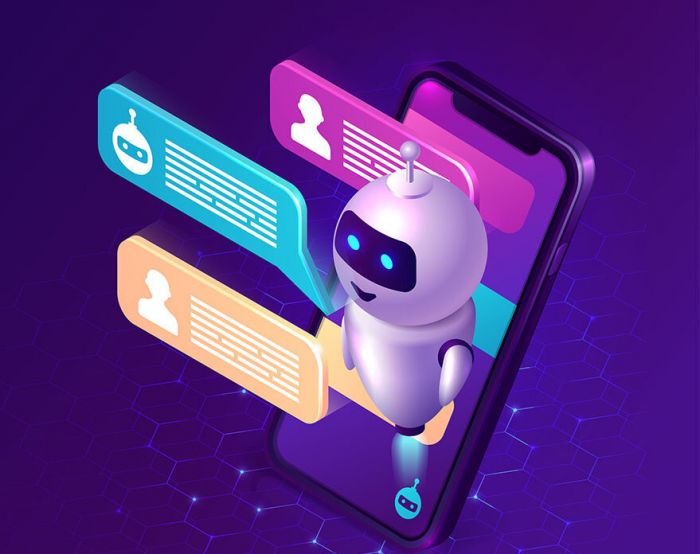

Artificial Intelligence (AI) is revolutionising the world of business communication, making processes more efficient and improving customer experiences. AI-powered chatbots have emerged as one of the most transformative AI technologies, swiftly becoming essential for businesses looking to streamline operations, enhance customer interaction, and maintain a competitive edge. With businesses relying heavily on digital platforms, the need for effective and intelligent communication tools is growing—and chatbots are at the forefront of this evolution.
AI-powered chatbots are software applications designed to simulate human conversation through voice commands, text chats, or both. These chatbots utilize Natural Language Processing (NLP) and Machine Learning (ML) algorithms to understand and respond to user inputs intelligently. Unlike traditional chatbots that rely on predefined scripts, AI chatbots learn from interactions, adapting over time to provide more accurate and personalized responses.
AeroChat is charge in of AI chatbot innovation enabling businesses worldwide to transform their communication strategies, automate routine tasks, and offer more personalized customer experiences. Through the use of their AI chatbots, organizations can boost engagement, streamline customer support, and enhance overall efficiency.
AI chatbots are making significant inroads in several areas of business communication. Some of the key applications include:
1. Customer Support Automation: AI chatbots have become a vital part of customer service strategies. They are available 24/7, providing instant responses to customer inquiries, which is critical in today's fast-paced digital world. This always-on capability ensures customers never experience delays, enhancing their overall experience. These chatbots can answer frequently asked questions, provide information on products or services, and escalate issues to human agents when necessary.
2. Lead Generation and Sales Support: AI-powered chatbots can serve as virtual sales assistants, engaging visitors on a website and collecting valuable information. They can guide potential customers through the sales funnel, suggest products or services, and even close sales by offering personalized recommendations. By automating these processes, businesses can generate more leads and increase sales without the need for constant human intervention.
3. Internal Business Communication: AI chatbots are also proving useful for internal communications within organizations. They can assist with employee onboarding, answer HR-related questions, or help manage schedules. Chatbots can even be integrated into team communication platforms like Slack or Microsoft Teams, offering employees instant access to vital information and improving overall productivity.
4. Data Collection and Analytics: AI chatbots are excellent tools for collecting data from customer interactions. The data they gather can provide businesses with valuable insights into customer preferences, pain points, and behaviour patterns. This information is critical for improving products and services, optimizing marketing strategies, and delivering more personalized customer experiences.
5. Enhanced Customer Engagement: One of the significant advantages of AI chatbots is their ability to engage customers proactively. By sending personalized messages, reminders, and follow-up questions, chatbots can keep customers engaged and foster stronger relationships. Whether it's through social media platforms, messaging apps, or websites, AI chatbots offer businesses multiple touchpoints to communicate with their customers effectively.

The rise of AI-powered chatbots is not just a passing trend; it’s a shift in how businesses communicate both externally with customers and internally with employees. Some of the primary benefits of incorporating AI chatbots into business communication include:
1. Cost-Effective Operations: Deploying AI chatbots can significantly reduce operational costs. Businesses no longer need to invest heavily in human resources for handling routine tasks, such as answering common queries or scheduling appointments. The scalability of AI chatbots also allows companies to handle more interactions simultaneously, reducing the need for a large workforce.
2. 24/7 Availability: Unlike human agents, AI chatbots can operate round the clock. They don’t require breaks, sleep, or time off, which ensures that customers receive timely assistance whenever they need it. This constant availability is crucial for businesses aiming to provide exceptional customer service and cater to a global customer base in different time zones.
3. Personalization at Scale: AI chatbots can use data from previous interactions to personalize conversations in real time. They can remember customer preferences, recommend relevant products or services, and offer tailored solutions based on individual needs. This personalized approach enhances the customer experience and fosters long-term loyalty.
4. Improved Response Time: With AI chatbots, there’s no waiting on hold or waiting for a response. They can handle multiple inquiries at once, providing instant replies to routine questions. Faster response times lead to higher customer satisfaction and better overall service delivery.
5. Reduction in Human Error: AI chatbots are programmed to follow certain protocols and rules, which minimizes the likelihood of communication errors. Human agents may make mistakes due to fatigue or miscommunication, but chatbots maintain consistency in their responses, ensuring accurate and reliable information is conveyed at all times.
As AI technology continues to evolve, the capabilities of AI-powered chatbots are expanding. Here’s a look at what the future holds for chatbots in business communication:
1. Advanced Natural Language Processing (NLP): In the future, NLP technology will become more sophisticated, enabling AI chatbots to understand and process complex languages, dialects, and colloquialisms with greater accuracy. This advancement will make conversations with chatbots feel even more human-like, enhancing customer trust and satisfaction.
2. Integration with IoT Devices: AI chatbots may be integrated with Internet of Things (IoT) devices, allowing businesses to provide even more personalized and seamless customer experiences. For instance, chatbots could interact with smart home devices, track delivery statuses, or manage in-store experiences, all in real time.
3. Emotionally Intelligent Chatbots: One of the most exciting developments in AI chatbot technology is the emergence of emotionally intelligent chatbots. These chatbots will be able to detect emotions based on tone, word choice, and facial recognition, adjusting their responses accordingly. This emotional intelligence will allow businesses to deliver more empathetic customer service.
4. Multilingual Capabilities: As global markets continue to expand, businesses are increasingly catering to customers who speak different languages. AI chatbots will become more adept at understanding and conversing in multiple languages, making them invaluable for businesses with a global reach.
5. Improved AI-Driven Insights: AI chatbots of the future will likely integrate even more advanced data analytics tools. They’ll not only be able to collect data from conversations but also analyze it in real time to provide businesses with actionable insights. These insights could include detecting emerging customer trends, predicting future behaviours, or identifying potential issues before they escalate.
6. AI Chatbots in Voice Commerce: With the rise of voice assistants like Siri, Alexa, and Google Assistant, AI chatbots will increasingly play a role in voice commerce. Customers will be able to engage with businesses via voice commands, placing orders or making inquiries hands-free.
The future of business communication is undoubtedly intertwined with AI-powered chatbots. As the technology continues to advance, businesses that invest in AI chatbots stand to gain a significant competitive advantage. From providing exceptional customer service to automating internal operations, AI chatbots are helping businesses across industries stay ahead of the curve.
AI chatbots are not just tools of convenience—they represent the future of how businesses will communicate, engage, and grow in an increasingly digital world. Companies that embrace this technology will be well-positioned to lead in their respective markets, offering seamless, efficient, and personalized experiences that customers expect.
Be the first to post comment!